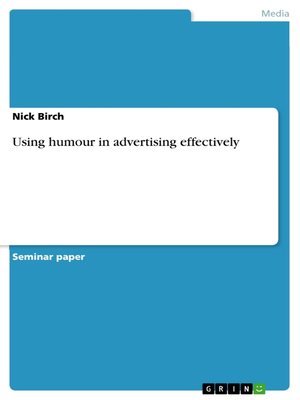
Sign up to save your library
With an OverDrive account, you can save your favorite libraries for at-a-glance information about availability. Find out more about OverDrive accounts.
Find this title in Libby, the library reading app by OverDrive.



Search for a digital library with this title
Title found at these libraries:
| Loading... |
Seminar paper from the year 2011 in the subject Communications - Public Relations, Advertising, Marketing, Social Media, grade: 1.1, , course: Advertising Design Communication, language: English, abstract: Advertising is all about getting attention. One of the best ways of getting attention through advertising is adding humour. When employed correctly, the power of humour is undeniable.
Professional Advertising (N/A) believes that '[t]he best ways to get attention with advertising are with strong visuals, sex, powerful headlines, and humour.' From all the types of advertising appeals, such as Emotional, Rational, Sex, Scarcity and Humour, '[h]umour can be an excellent tool to catch the viewer's attention and help in achieving instant recall which can work well for the sale of the product. Humour can be used effectively when it is related to some benefit that the customer can derive without which the joke might overpower the message' (Ashwini, 2009). Humour is most effective when it is used to reinforce an existing message, rather than simply adding to it. Catanescu & Tom (2001) maintain that '[a]s previous research has revealed... [their] study shows that humour is used more frequently in television commercials than print advertisements' and so it is with this acumen that generates the focus on television commercials. What humour achieves exactly can differ from one advertiser to the next, but its primary function seems to be about getting attention, regardless if it is good or bad attention.
According to a 1993 Journal of Marketing study that examined multinational effects of humour on advertising, 'humour is more likely to enhance recall, evaluation, and purchase intention when the humorous message coincides with ad objectives, is well-integrated with those objectives, and is viewed as appropriate for the product category. Under such circumstances, humorous advertising is more likely to secure audience attention, increase memorability, overcome sales resistance, and enhance message persuasiveness' (Dubois, 2010).






